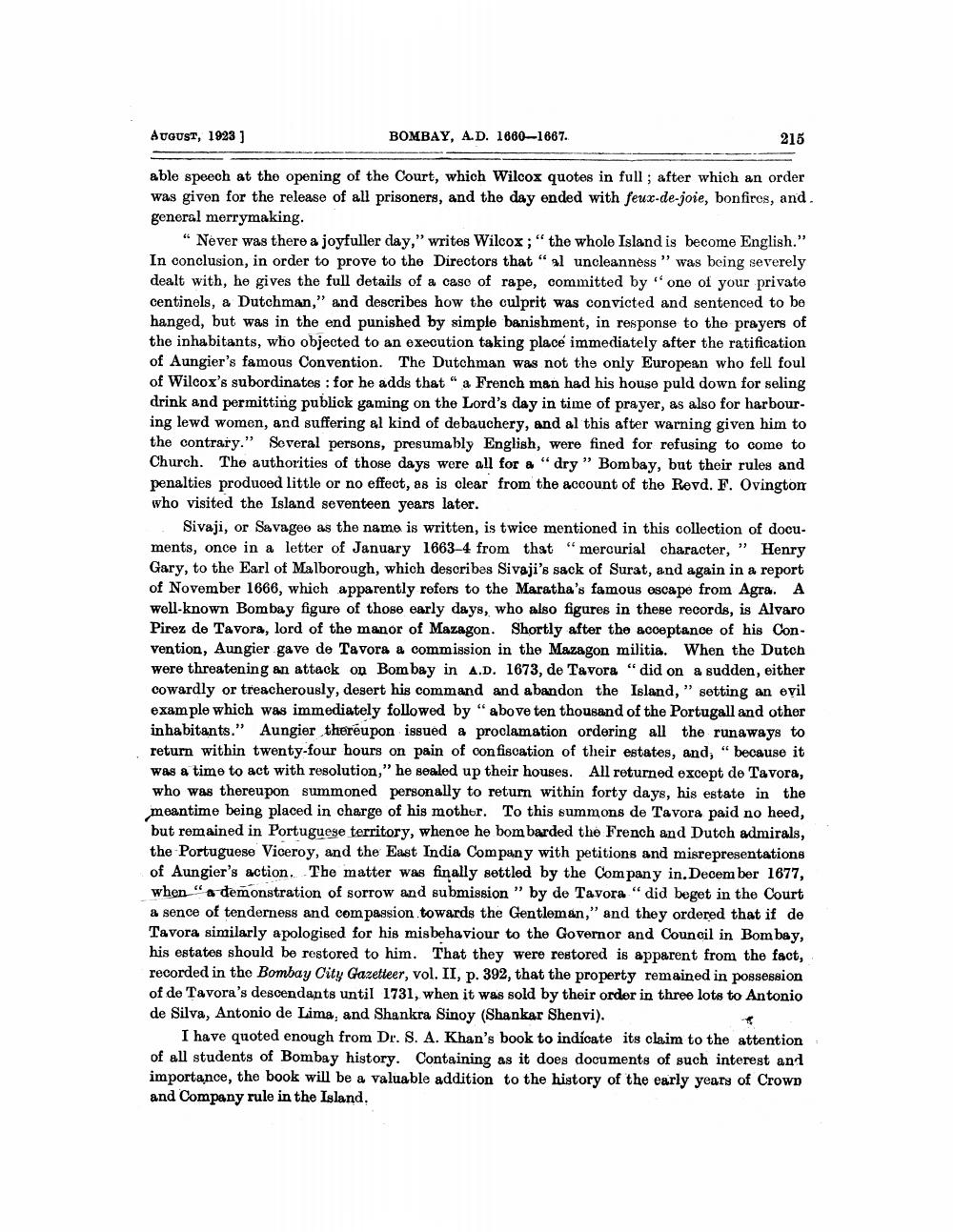________________
AUGUST, 1923 ]
BOMBAY, A.D. 1660-1667.
215
able speech at the opening of the Court, which Wilcox quotes in full ; after which an order was given for the release of all prisoners, and the day ended with feux-de-joie, bonfires, and general merrymaking.
"Never was there a joyfuller day," writes Wilcox;" the whole Island is become English." In conclusion, in order to prove to the Directors that "al uncleanness" was being severely dealt with, he gives the full details of a case of rape, committed by one of your private centinels, a Dutchman," and describes how the culprit was convicted and sentenced to be hanged, but was in the end punished by simple banishment, in response to the prayers of the inhabitants, who objected to an execution taking place immediately after the ratification of Aungier's famous Convention. The Dutchman was not the only European who fell foul of Wilcox's subordinates: for he adds that" a French man had his house puld down for seling drink and permitting publick gaming on the Lord's day in time of prayer, as also for harbouring lewd women, and suffering &l kind of debauchery, and al this after warning given him to the contrary." Several persons, presumably English, were fined for refusing to come to Church. The authorities of those days were all for a "dry" Bombay, but their rules and penalties produced little or no effect, as is clear from the account of the Rovd. F. Ovington who visited the Island seventeen years later.
Sivaji, or Savageo as the name is written, is twice mentioned in this collection of documents, once in a letter of January 1663-4 from that "mercurial character," Henry Gary, to the Earl of Malborough, which describes Sivaji's sack of Surat, and again in a report of November 1666, which apparently refers to the Maratha's famous escape from Agra. A well-known Bombay figure of those early days, who also figures in these records, is Alvaro Pirez de Tavora, lord of the manor of Mazagon. Shortly after the acceptance of his convention, Aungier gave de Tavora a commission in the Mazagon militia. When the Dutch were threatening an attack on Bombay in A.D. 1673, de Tavora "did on a sudden, either cowardly or treacherously, desert his command and abandon the Island," setting an evil example which was immediately followed by "above ten thousand of the Portugall and other inhabitants." Aungier thereupon issued a proclamation ordering all the runaways to return within twenty-four hours on pain of confiscation of their estates, and," because it was a time to act with resolution," he sealed up their houses. All returned except de Tavora, who was thereupon summoned personally to return within forty days, his estate in the meantime being placed in charge of his mother. To this summons de Tavora paid no heed, but remained in Portuguese territory, whence he bombarded the French and Dutch admirals, the Portuguese Viceroy, and the East India Company with petitions and misrepresentations of Aungier's action. The matter was finally settled by the Company in. December 1677, when "a demonstration of sorrow and submission " by de Tavora "did beget in the Court a sence of tenderness and compassion towards the Gentleman," and they ordered that if de Tavora similarly apologised for his misbehaviour to the Governor and Council in Bombay, his estates should be restored to him. That they were restored is apparent from the fact, recorded in the Bombay City Gazetteer, vol. II, p. 392, that the property remained in possession of de Tavora's descendants until 1731, when it was sold by their order in three lots to Antonio de Silva, Antonio de Lima, and Shankra Sinoy (Shankar Shenvi).
I have quoted enough from Dr. S. A. Khan's book to indicate its claim to the attention of all students of Bombay history. Containing as it does documents of such interest and importance, the book will be a valuable addition to the history of the early years of Crown and Company rule in the Island,




